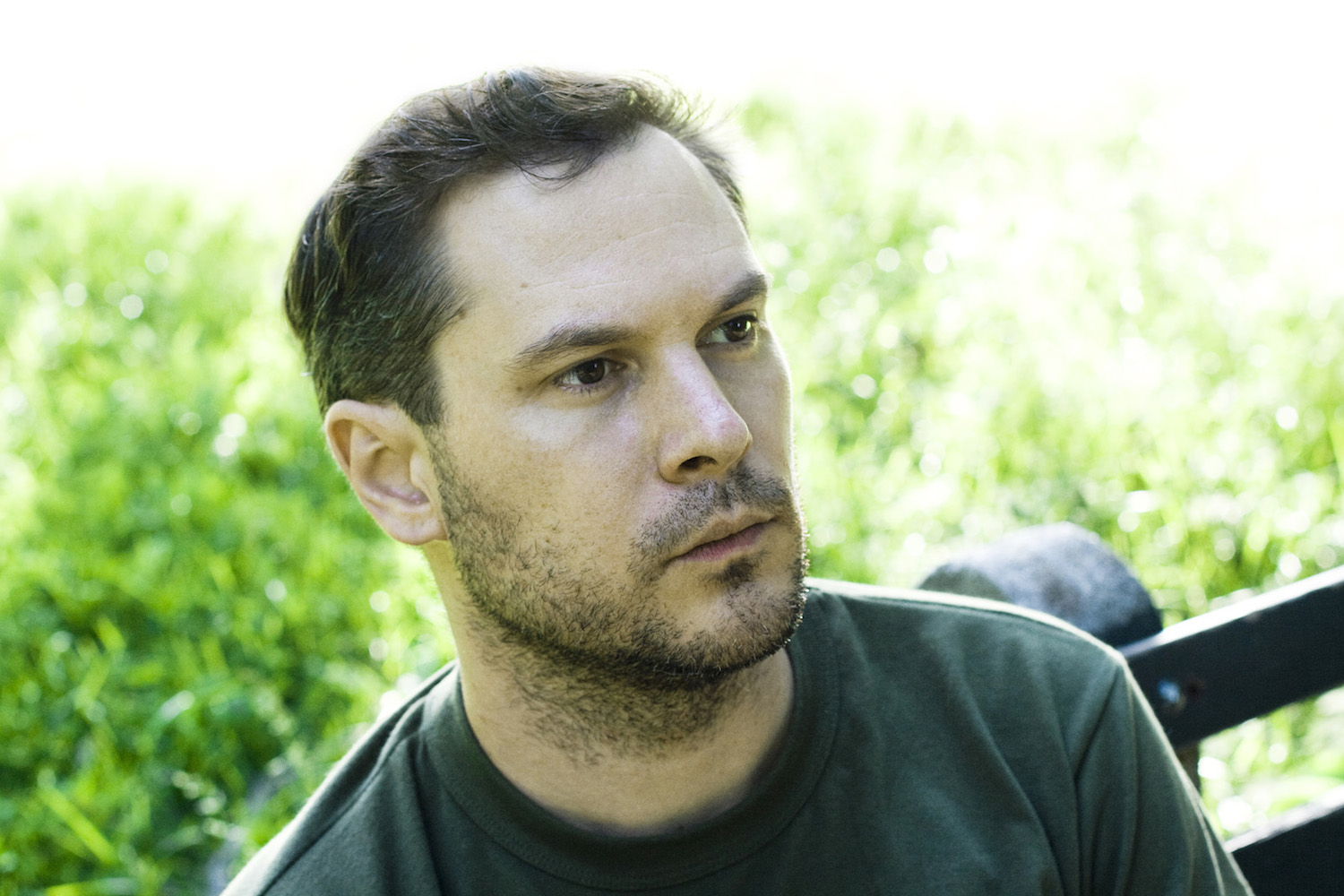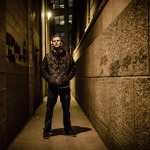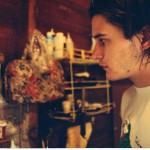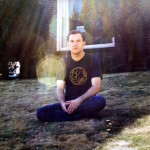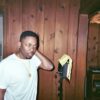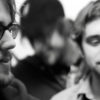Photography ELIZA SOHN
Easily one of the most prolific and elusive figures in underground music these days, Emil Amos got his start stockpiling solo recordings as Holy Sons in the ’90s and eventually emerged from a self-imposed exile with the expansive, Neurosis-endorsed instrumentals of Grails, the psych-steeped beats of Lilacs & Champagne, and the mind’s eye melodies of the Sleep-related side project Om. Everything seems to circle back to Holy Sons in the end, however, probably because it’s what made him fall in love with songwriting in the first place.
“When I saw Sebadoh open for Fugazi in ’91 at the old Cat’s Cradle in Chapel Hill it was my meditation-rod moment,” Amos wrote in an essay about a collection of old Holy Sons material (My Only Warm Coals) last year. “Like when the guru hits you hard with a stick and confusion dissipates as you slowly realize your place in the universe. While proselytizing over drinks at a party I might proclaim that I witnessed the greatest band in the world pass the torch to a whole new breed of chaos, aggression and inner-loyalty. But the imaginary torch-passing I saw was probably just a projection of the quasi-religious transition from hardcore to lo-fi occurring inside my over-active teenage mind.
He continued, “Ironically, after that intense communion, I ended up spending the rest of the ’90s completely outside of the music world, recording daily in a basement as a self-styled form of experimental therapy. After a blinding light had been shined down into the caverns of underground music post-Nirvana, I’d felt like the party was over and retreated for about 10 years to do what I did alone… a ritual that friends often remarked ‘wasn’t even music at all’. I took their sentiment as a huge compliment but also confirmation that I didn’t belong anywhere and ultimately had no consumable or listenable worth.”
Now that a growing cult audience has discovered many of the soul-searching songs Amos buried decades ago, he’s as driven as ever to take Holy Sons in fresh new directions and produce a never-ending stream of records that resonate well outside his own self-contained space. Aside from a headphone-friendly new album (The Fact Facer) that hits shops through Thrill Jockey next Tuesday, Amos is in the midst of fine-tuning his live show with two different bands—one in his newly adopted home Brooklyn, and one back in Portland, where he spent the past 13 years getting to this point.
In the following exclusive, we premiere a new video from Holy Sons and take a deeper look at Amos’ drug-induced discography, his ever-evolving approach to art and everyday life, and what we can all learn from Tim Buckley…
You recently moved to Brooklyn after more than a decade in Portland. When did that happen and why?
I grew up on the East Coast and it was just a matter of time before I got pulled back or it became an exotic thing I needed to rediscover. I was in Portland for 13 years working at the same homeless shelter and doing virtually the same things everyday that entire time. So it served as an essential transition period of my adult life, but just the day to day tedium needed to be broken up with new scenery. Coincidentally, Om had an upcoming show at the Metropolitan Museum and an old friend of mine offered me a place in NYC for the same exact rent I’d been paying in Portland so I really had nothing to lose.
You’re not exactly a lazy guy. In fact, it seems like you never stop working. That said, living in New York forces most people to work even harder due to the cost of living and the general vibe and pace of the city. Have you felt this sense of urgency since you moved here? Or are things not all that different from when you lived in Portland—very wherever you go, there you are?
It’s definitely been a healthy change and I love NYC. It seems that by living here you’re sort of inadvertently announcing that you’d like to be challenged in general. For better or worse though, I still ultimately live in a cave. My working methods exist in their vacuum and then the outside world mostly comes into play when its time to establish the deadline for a project. That kind of autonomy is probably just a product of coming up in the early ’90s home recording era… That kind of separation from everything is nice because it feels like it grants a kind of total control over the message you’re sending back out into the world.
While Holy Sons may still seem like a new project to some fans of Grails and Om, it’s been the center of your creative universe for quite some time. Let’s say someone wants to dive into the rather deep Holy Sons back catalog; where should they start?
Everybody always points to Decline of the West and I like that for a couple different reasons. First, its better to have made a record that someone somewhere can feel is your ‘classic record’ rather than worry too much about making a record that has to compete with that watermark. Also, that record was initially ‘rejected’ by one label who said it wasn’t ‘hi-fi’ enough and then another label that said it wasn’t ‘lo-fi’ enough… So obviously they were both totally wrong! I guess it just shows that you shouldn’t take what ‘experienced people in the industry’ have to say very seriously.
What’s one of the more rewarding Holy Sons records—one that requires multiple spins to truly appreciate, or one that you’re especially proud of but few people have checked out compared to your other work?
Most people I’ve met seem to say Criminal’s Return is sort of the dark horse and I used to say My Only Warm Coals was my favorite, but now I think Lost Decade III is actually going to be one of the weirdest ones yet (currently being scheduled for release next year).
Is it an exaggeration to say you’ve written more than 1,000 songs under the Holy Sons name over the years? Have you been good about archiving your material, or has a lot of it been lost over the years?
I started seriously digging through old boxes of master tapes from the ’90s when I moved out here to continue the Lost Decade series. I’d assumed that a lot of the master tapes from the ’90s had been taped over or lost at some point. But after retrieving a few boxes of unlabeled tapes from Chapel Hill and some in Portland, I’ve found the original recordings of every song I was looking for so far. I was a pretty hyper kid so I remember getting home from high school and recording up to five songs in a night if I could get that much time alone. So over 1,000 wouldn’t be that hard to add up since ’92, y’know?
You’ve called Holy Sons a way of “facing your own personal reality” before. When you look in the mirror these days, what do you see? And when you look at the world around us all, do you see nothing but the despair, war, etc. that dominates our headlines, or do you see a few glimmers of hope?
From a Taoist viewpoint, I think a lot of human life is spent trying to force our blueprint on top of the world, trying to dominate and re-script the universe. So the idea that things are getting worse or being surprised at some of the miseries of temporal life could just be another anthropomorphic projection error in itself. I believe in a larger program of evolution and pre-destiny, but the earth will most likely die in a relatively horrible way regardless of what we hope for. I can only carry out the mission that was made for me. So that’s what generally makes me happy—doing what I was built to do as well as I can.
You spent much of the ’90s making music outside of the public eye. What are some key things you learned about yourself during that time?
Well back then I was in constant pain about it. I didn’t know if things would ever work out for me musically, but I was mostly just trying to manhandle the science of musicology and make good on the potential I thought I had. But I was haunted by the idea that none of it would ever be of use to anyone else.
I was reading about Tim Buckley the other night and he took an extreme jazz player’s attitude about the job of a songwriter. He didn’t think he owed the audience anything but to follow his own instincts to wherever they wanted to go on any given night. I dabbled with that attitude for almost a decade in the ’90s and I’m really thankful that I ultimately wanted to transcend that way of thinking and break through to the other side. I guess it’s not ironic that I have a hard time listening to Tim Buckley and it kind of mystifies me that someone that intelligent wouldn’t accept the idea that improving your ability to communicate is connected to improving your technique and art.
“All the bad stuff gave me my best songwriting material anyway so I can’t regret that right? Drug-damaged songs are killer.”
Judging by what you’ve said in the past, it sounds like drugs played a major part in helping you understand things, for better or for worse.
They unquestionably helped. I think suffering from the effects of testosterone as a teenage boy is actually pretty harrowing and I needed something to knock me out into a more objective state of mind. That ‘objective state of mind’ eventually went too far into a form of total disassociation, but melting down your ego and testing the assumed boundaries of reality are just part of the old cliche pact of deciding to live the poetic life—something you start daydreaming about when you’re a little kid y’know? So drugs were an inevitable agent in that commitment. It wasn’t about trying to destroy myself or run away from everything like those other self-destructive scripts go, even though that’s a big part of learning about yourself from the overall experiment too.
What’s one of the most profound, or the most frightening, experiences you’ve had while experimenting with drugs?
I’ve watched my mind fully disconnect, become its own entity, create all sorts of mocking imagery and talk to me from a perspective I couldn’t understand… which was a bad night for sure. You can read an old anecdote about OD’ing on hallucinogens in India here.
As you’ve gotten older and faced the anxiety that comes with age, have you found it harder to enjoy psychedelics?
I think a huge aspect of that dynamic is understanding the balance between the time you have on earth and the ambition you have to really use that time well. There was an earlier period where it made sense for me to abandon everything that’s supposed to be civilized, right and healthy… and LSD taught me about my own autonomy, power and destiny during that era. Then there was a natural time of recovery, self-preservation and reporting back on what I learned. When you’re 17 all you have to do is go to work and wash the fucking dishes y’know? So why wouldn’t you spend the rest of the night wandering around the train tracks channeling voices directly into your handheld tape recorder in a drug-induced trance? But these days I’ve got so many concrete things I need to get done that are equally important and shouldn’t be interrupted either.
Do you feel like psychedelics open a door that’s relatively impossible to close from that point on? In other words, do you feel like they show you things about yourself and the world around you that make it impossible to look at things the same way again? If so, is this both liberating and frustrating?
I asked my Taoist teacher in college something like that once and he said “I took so much that I am still constantly high… extremely high… don’t need to get high anymore.” I feel like that too but I’d say it was all a purely liberating process in the end. I mean all the bad stuff gave me my best songwriting material anyway so I can’t regret that right? Drug-damaged songs are killer:
How did living in Chapel Hill compare to Miami, Florida? Did you move there with your mother because your parents had separated?
They divorced when I was 2 and we moved to NC a little later on in ’81 because Miami was becoming extremely violent at the time and she thought Chapel Hill would have better schools etc.
How did Chapel Hill’s indie rock scene influence you, and when did you leave it for Portland?
Chapel Hill spoiled me. No one could’ve predicted that tiny town would’ve made such an impact and I was so young that it all seemed normal to me to have all this communal intelligence directed towards underground music. And then by ’95, it felt like the heyday that began with Flat Duo Jets and Polvo was beginning to end and the world of underground music was becoming a lot less risky and more boring. I left for a small college in the mountains of North Carolina and ultimately dropped out for the rest of the ’90’. I recorded everyday, more serious than ever, but I didn’t see myself out in the world at all. In ’99 when I graduated I spent the summer living in LA with my friend Duncan Trussell and then relocated to Portland where my girlfriend had been living. I knew that I was obligated to myself to begin the long road of playing music live and so a whole new kind of misery began as I was really resistant to basically becoming an entertainer. But luckily after three years of fucking around Grails got signed by Neurosis and we began to get out of town and make some serious records.
What about Lilacs & Champagne? As you’ve worked on that more, have you found producing more rewarding than singer-songwriter fare in some ways? Could you see yourself producing a hip-hop record at some point? (It seems like you’d be a natural for that; at least in a more left-field, Madlib-like way.)
That would be great, but a significant amount of factors would have to align to make an interesting hip-hop record happen. If there’s one thing you learn to rely on as an artist, its that the world will never hand you ANYTHING. So if you want to do something it means you’re mostly likely going to have to do all the hard work alone. And with projects that are largely community-based—like working on a film or working in collaboration with MCs—someone would probably have to come out of the woodwork with an awesome proposition and I don’t really have time to wait around for that. In addition, generally 90-percent of people dabbling in art aren’t really up for the actual hard work it’ll take to really make something truly great and unique so you have to choose your time wisely. Producing is generally my favorite part of the process but the economy of music these days couldn’t really support allowing me to do that in any full-time way. Those days are basically over.
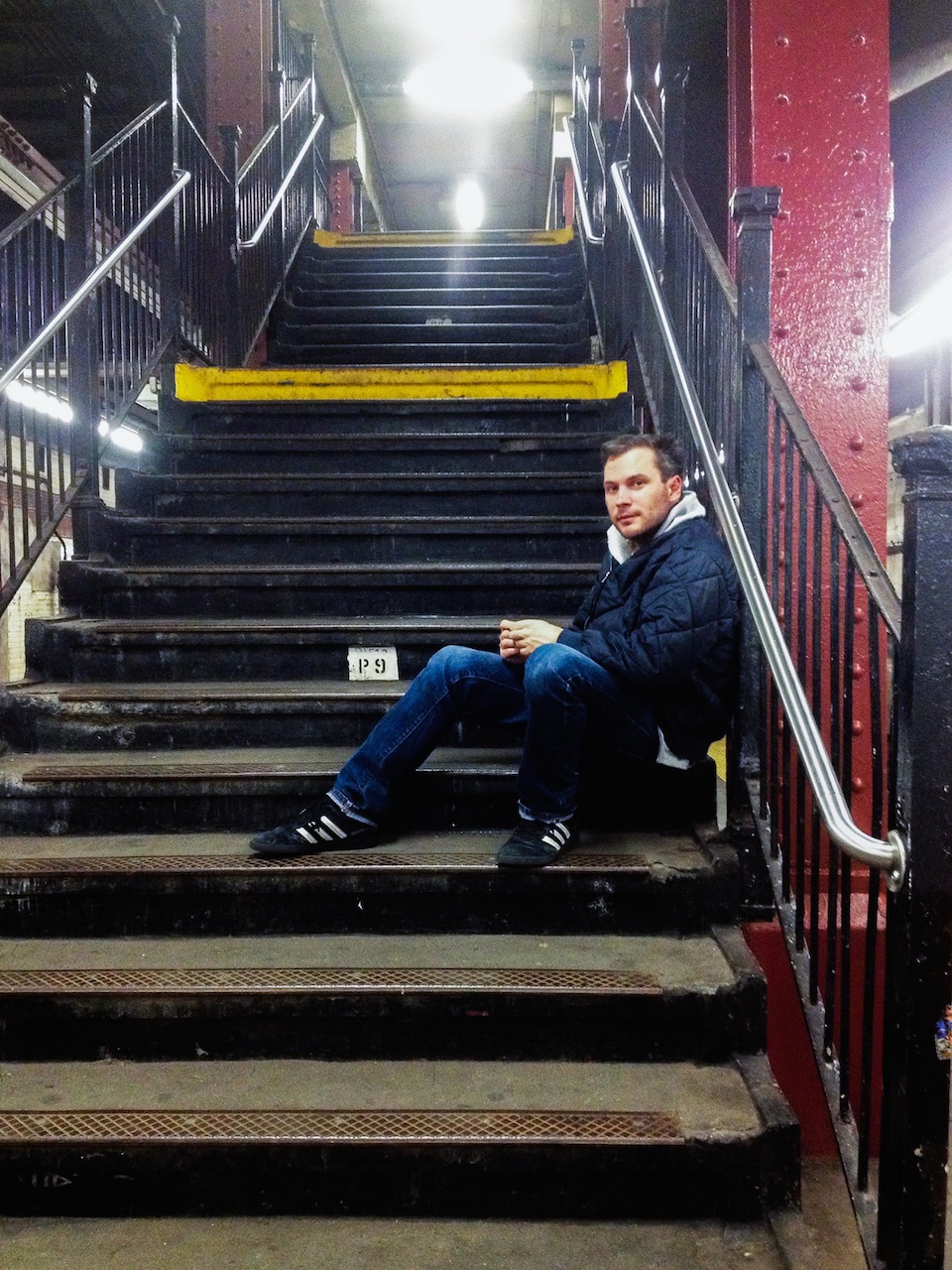
A lot of people would argue that guitar-based music is on the decline these days, with many ‘indie bands’ adopting synths in their sound and others pursuing more straightforward electronic music. As someone who’s seen these things evolve over the past three decades, how do you feel about where things are at as a whole, and how do you see your own music fitting (or not fitting) into it?
We’re always in a point of transition in terms of styles, so I’d argue that being able to shape-shift will give you more longevity than being located in what people are considering the ‘cutting edge’ (which already implies that the quality of your songs is communicating something deep enough that it can transcend its medium). You could also argue that being initially out of style is even smarter than being in style because you’ll stand out quicker (see the eventual rise of Ariel Pink). Guitar music isn’t really on the decline though; it’s still everywhere you look (especially with young bands doing the ’90s thing) and electronics are mostly just being interwoven into the same old Beatles blueprint. That takeover has been threatened since electronic music was invented because it sounds sensational I guess. Great ideas and great melodies form the perennial core of music and those basic tenants can’t really be removed. Instrumentation is pretty relative in the end.
What are your plans for the rest of the year? Are you going to be balancing your time between Holy Sons and Om, generally speaking?
Om and Holy Sons each have US tours coming up in October and November in the Northeast. The next Om record is about halfway done and I’m getting close to finishing up two different Holy Sons records at the same time (a brand new one and another of unreleased songs from the ’90s).
Finally, tell us about the video we’re premiering today.
“Transparent Powers” was the second-to-last song I remember writing at my homeless shelter job in Portland during a mind-numbing meeting while I was incredibly hungover. The album version is based around sample-based sound-collage, but our new band in NYC is doing kind of chill Big Star ballad version.
